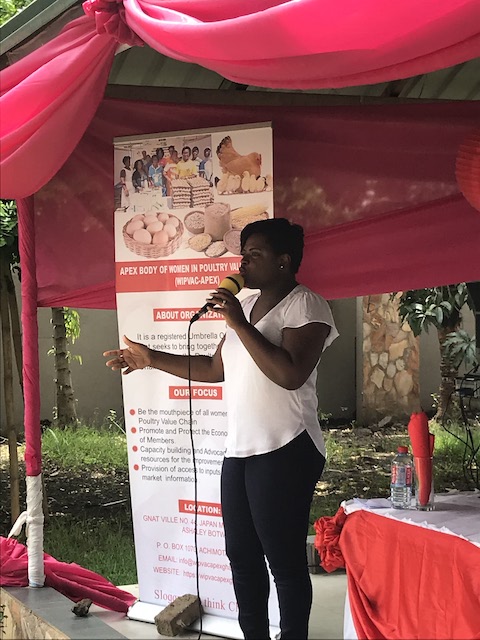
As we prepare for World Egg Day on October 8, ASA/WISHH commends Ghana’s egg and nutrition leaders who are sustaining the momentum for egg nutrition.
Ghanaian dietitian Naana Adjei helped create Ghana’s National Egg Campaign Secretariat along with poultry industry leaders and Ghana’s Ministry of Food and Agriculture. She sees the combination of WISHH’s AMPLIFIES Ghana project and the Ghana National Egg Campaign Secretariat (GNECS) as a powerful combination. She raves about how more and more Ghanaians are consuming eggs in the country, providing a cost-effective source of protein.
“Because of the education around eggs, which really started with AMPLIFIES, more and more people are getting protein from eating eggs,” Adjei says. “Although the AMPLIFIES project has ended, the egg secretariat has kept the momentum going.”
It’s a story that begins with the commitment U.S. soybean growers have made to global food security as it connects trade and development.
In 2016, WISHH launched AMPLIFIES, formally known as Assisting in the Management of Poultry and Layer Industries with Feed Improvement and Efficiency. Funded by the U.S. Department of Agriculture’s (USDA) Food for Progress Program, AMPLIFIES grew Ghana’s poultry industry capacity, which relies heavily on soy for animal feed.
Due to the increased demand for poultry feed in Ghana, U.S. soybean growers recognize the potential trade opportunity in the market. Importantly, the project also included an egg nutrition campaign that led to WISHH’s 2020 egg consumption survey, which showed record numbers of Ghanaians benefiting from eggs. What’s more, 73% of people who had heard WISHH’s Ghana National Egg Campaign messages reported the information positively changed their perceptions about eggs and their nutritional benefits. Per capita consumption of eggs in Ghana has climbed from 172 in 2016 to 235 in 2020. As a comparison, U.S. annual per-person consumption of eggs and egg products in 2019 was 293, according to USDA. For Adjei, that means more people are reaping the benefits of more protein in their diet.
As for the egg secretariat, it is turning up the heat in another way—promoting the nutritional benefits of eggs through trainings with some of Ghana’s key stakeholders, from dietitians to farmers.
The egg secretariat aims to increase education around the health and economic benefits of eggs. Adjei is excited to continue speaking about the nutritional value of adding eggs to the daily diets of Ghanaians. She is holding training sessions with other dietitians in Ghana, knowing they are vital stakeholders and carriers of her message. “I am planning meetings and reaching out to dietitians and nutritionists,” Adjei says. “If there is ever a chance to speak to a group, I will jump at it!”
“It’s about the combination of financial value and nutrition,” Adjei continues. “We have been able to capture so many people with the training of trainers.”
Initially funded by USDA’s Agricultural Trade Promotion (ATP) program, both the financial and nutritional trainings are making a huge impact across the value chain in Ghana. In speaking to nutritionists, Adjei stresses they appreciate the use of evidence backed by science on the nutritional benefits of eggs.
Now the dietitians are carrying the message of health back to others in their communities. She reports dietitians are looking forward to organizing community seminars. Feedback is so positive, Adjei says, the training is scaling up representation in more regions. Adjei is also careful to note that the trainings have been holistic.
“We didn’t just focus on boosting the poultry industry by increasing consumption of eggs,” Adjei says. “People needed to understand how eggs are great for their diet. I love that ASA/WISHH has pushed the message of nutrition because it should be at the forefront of trade.”
Lastly, Adjei notes that the trainings show how strategic partnerships create a fruitful relationship for everyone involved. She loves how soybean farmers have given nutrition a great place in the training program and says it points to future success for U.S. soy as well.
“I’m quite sure this will cascade into greater demand for U.S. soy. More eggs mean a better poultry industry. And that industry is reliant on soy.”
WISHH is a program of the American Soybean Association and is funded in part by the United Soybean Board and state soybean board checkoff programs.
